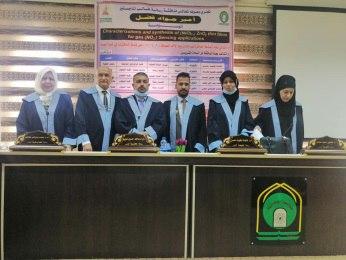The Faculty of Science at Kerbala University has discussed the M.A. thesis entitled ” Fabrication and characterization of (NiO) 1-x (ZnO) x thin films for gas sensor applications”.
The thesis has been submitted by the student Amir Jawad Fadhl from the Physics Department. It aims at preparing thin films of 1-x (ZnO) x (NiO) materials on glass and silicon using PLD. measurement of the structural, electrical and optical properties of thin films (NiO) 1-x (ZnO) x prepared on glass. And the manufacture of a gas sensor from thin films prepared on silicon for the gas sensor of NO2 and NH3.
The thesis deals with preparing compounds from (NiO) 1-x (ZnO) x with different proportions of zinc oxide by mixing nickel oxide with high purity zinc oxide in different proportions and then sintering the mixture in an oven at 1273 ° C for five hours. The resulting powders were ground and pressed into tablets. Thin films were prepared from (NiO) 1-x (ZnO) x using the 0.1M pulsed laser deposition method on different surfaces such as glass and silicon chips.
The study indicates that the composition of the compounds and the prepared films was examined using X-ray diffraction. The X-ray spectrum revealed that all the prepared compounds and membranes were of a polycrystalline structure and that the peaks were identical to the cubic phase and the hexagonal phase of nickel oxide and zinc oxide at the content.
The message concluded that the pulsed laser deposition method produced thin films (NiO) 1-x (ZnO) x for all zinc oxide content, and that increasing the doping ratio of ZnO leads to an irregular increase in the size of the crystals, and that the average diameter and average roughness change inversely with increasing Zinc oxide content, increasing zinc oxide content in prepared thin films (NiO) 1-x (ZnO) x compensates the states in the band gap, thus reducing the density of the carriers and thus reducing the conductivity and increasing the activation energies of the prepared samples. On the type of conduction of the host material.
































































